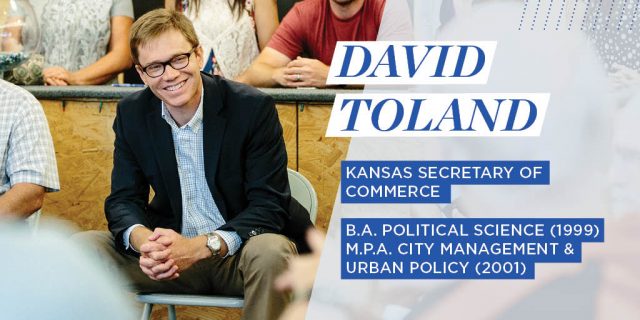
Why David’s a Hawk to Watch:
Serious issues call for serious action. And David Toland has long been guided by the philosophy that real-world results are best achieved through a willingness to roll up one’s sleeves and work collaboratively to put concrete plans in motion, or as he aptly put it, “stop talking about it — get up from behind your desk and make it happen.”
A seventh-generation Kansan and fourth-generation Jayhawk, David has devoted his career to improving communities at both local and national levels, serving in nonprofits and government in Kansas and in Washington, D.C. Now as Acting Secretary of Commerce for Kansas, David is at home leading the state’s economic development agency for Governor Laura Kelly, working to expand employment opportunities within Kansas communities.
As an undergraduate at KU, faculty mentorship together with the hands-on experience he gained as a student in the Political Science program opened David’s eyes to a world of possibilities, setting him on a path to explore what would become the major focus of his life’s work: diving deep into areas and problems that many would be happy to turn away from. And since earning his M.P.A. in City Management & Urban Policy from KU in 2001, he’s continued to tackle issues including economic development, urban policy, and affordable housing. It’s no wonder that David was named one of Ingram’s 50 Kansans you should know in 2018!
Meet David, and see what he had to say about family and lifelong friendships forged at KU, his passion for Kansas communities, bouncing back in the face of unexpected tragedy, the inexplicable power of everyday kindness, and his love of David Bowie. Discover why David’s a Hawk to Watch.
Tell us in a sentence or two what you do for a living:
As Secretary of Commerce I lead Kansas’ economic development agency for Governor Laura Kelly. At Commerce we work to recruit and retain jobs; connect job-seekers and employers; and administer federal grant programs that help build libraries, water systems, and roads across our state.
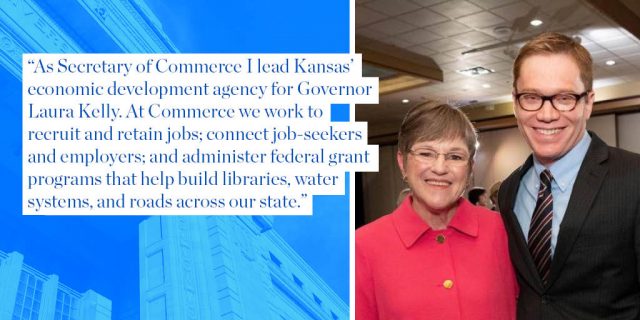
How did you end up doing what you do? Was there a certain moment when things came together? Or was it a longer journey?
Throughout my career I’ve sought opportunities to join turnaround efforts — to go to places that needed help and where oftentimes other people didn’t want to go. That’s what drew me to the District of Columbia when it was under federal receivership; back to rural Kansas, where most metrics of well-being have been in decline for a century; and to state government, which has been badly damaged by ideology and mismanagement for most of the last decade. To the extent I’ve had a career plan it’s been about pursuing opportunities that were intellectually stimulating and personally fulfilling rather than taking whatever was considered the safe or “right” path.
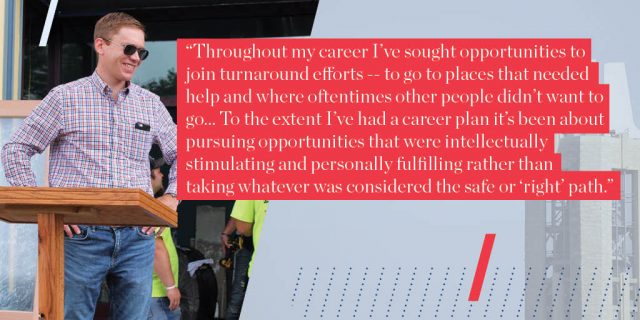
What do you feel is your biggest achievement so far?
Allen County, Kansas’ recognition as a Robert Wood Johnson Culture of Health Prize winner in 2017 was a personal and professional high point when I was CEO at Thrive Allen County. All my life I’ve been proud of my home county, but having our community’s efforts recognized by one of the largest foundations in the world elevated that pride to a new level.
What’s your lowest career moment and how did you pick yourself up and move on?
In 2015 our grant writer, thought partner and friend at Thrive Allen County, John Robertson, died unexpectedly. When you run a non-profit that is 90% funded by grants, the death of the grant writer creates an existential crisis for your organization. It also takes a human toll — the five of us remaining at Thrive were incredibly sad to have lost our friend and colleague… but we had no time to mourn him because we had to focus on keeping the Thrive ship afloat. If Thrive was to survive — and if our staff were to keep their jobs — we had no choice but keep writing grants, submitting reports, and designing and running great programs. There’s no silver bullet or special sauce that can help your organization survive something like that; the only response is to grind it out. Being mentally and emotionally tough, and working nonstop, was the key to our survival.
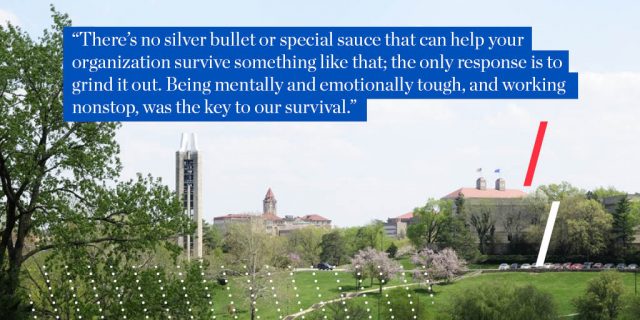
The lesson for others enduring similar situations is that someday — when you’re out of the woods — you can take time to mourn the loss and be thankful that you survived, but if you pause to catch your breath too soon you can quickly lose everything you’ve worked for. I’m thankful every day for the lessons of that experience, but I’d never want to endure it again.
Where do you hope to be in 10 years?
I’ve never been one to make long-term plans like that.
What do you know now that you wish you could tell your 18-year-old self?
I don’t know how or why this works, but I’ve learned that if you’re having a bad day, the best way to feel better is to help someone else. Don’t focus on your own problems — focus on people you sense or know are struggling. By trying to improve their day, you improve your own. So pay the compliment, even if you don’t think they’ll care; write the note, even if you don’t have nice stationery; hold the door, even if you’re in a hurry; and give a smile, even if it might feel fake. The return on investment is incredible.
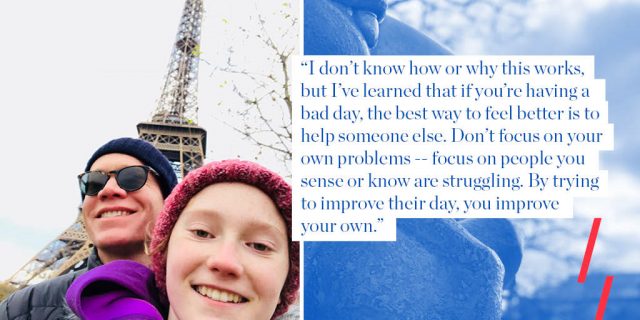
What’s your best career pro-tip?
Action removes doubt. Stop talking about it — get up from behind your desk and make it happen.
How did your KU degree prepare you for your current job?
As an undergraduate in the Political Science program at KU I had amazing professors — Burdett Loomis and the late Allan Cigler in particular — who opened up a world of possibilities for me. As a sophomore I was one of Bird Loomis’ Washington interns, where I served subpoenas and photographed crime scenes as an intern at the DC Public Defender Service. It was quite an eye-opener for a kid from small-town Kansas. That experience helped clarify what I really wanted to do: fix broken communities. Ultimately that led me to the KU MPA program where professors like John Nalbandian, Steven Maynard-Moody and Chuck Epp (among many others) presented a blend of academic theory and real-life case studies that enabled me to actually get things done when I started working in local government. I would also add that most of my closest friends to this day are people I met in the “3E” program at Ellsworth Hall as a freshman in 1995, and that I’m a FOURTH generation Jayhawk and very proud of it!
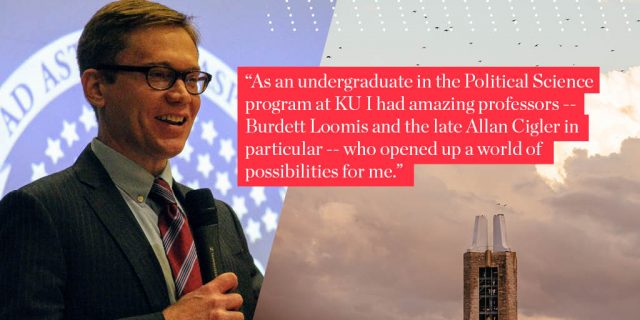
What do you do after you’ve clocked out?
My wife Beth (a KU School of Ed alumna) and I have two amazing kids, Caroline (age 12) and William (age 9), and we’re happy that they are growing up as “free range” kids in Iola. The kids and I love to watch old episodes of the 1980s TV show Dallas; renovate old buildings; ride (and build) trails in Allen County; and travel abroad. We took an amazing trip to Iceland and Paris in November to celebrate Beth’s 40th birthday and made a lot of terrific memories.
What is a fun fact about you that surprises people?
I am a huge David Bowie fan. So much so that I dressed up as Ziggy Stardust for Halloween this year.
Learn more about David’s work with Thrive Allen County in this video from the KU School of Public Affairs & Administration:
Be like David. Tackle the big issues and look for solutions to the problems that matter most to you. For more information, visit the School of Public Affairs & Administration and the Political Science Department at the University of Kansas. Also, visit Thrive Allen County, the Public Defender Service, and the Kansas Department of Commerce.
Hawks to Watch are disrupters. They’re poised for greatness, inspiring their colleagues and excelling in their professions. Basically, they’re killing it. Having recently graduated, they are just starting to leave their mark and we can’t wait to see how their story unfolds. These Jayhawks span all industries including business, non-profits, tech, healthcare, media, law and the arts.